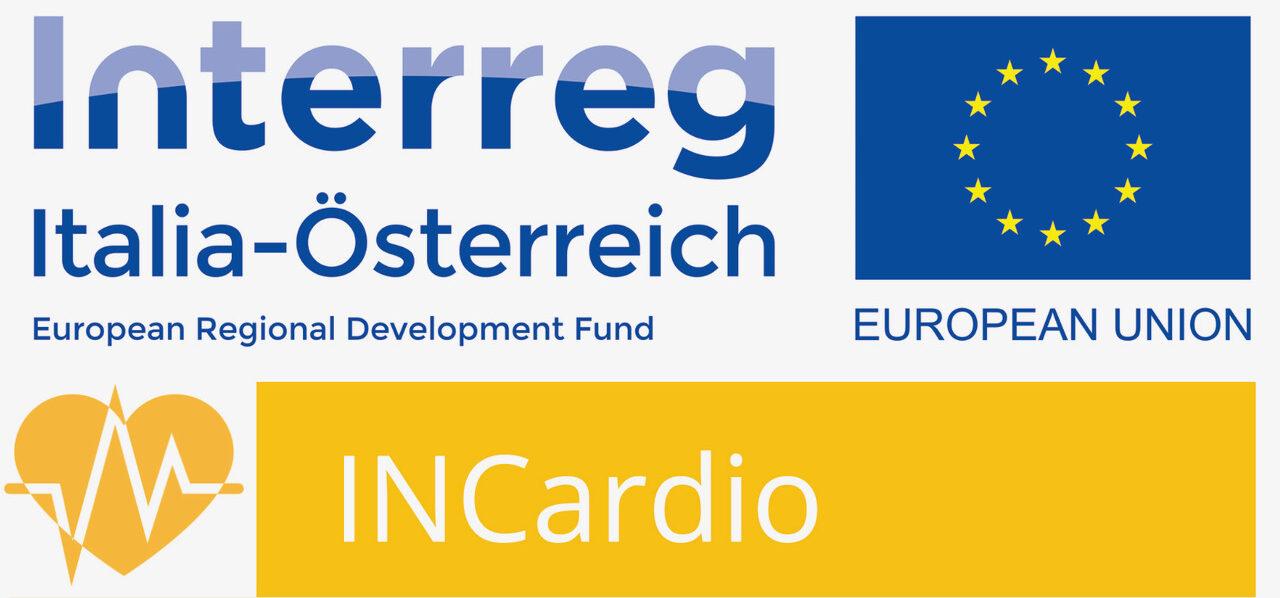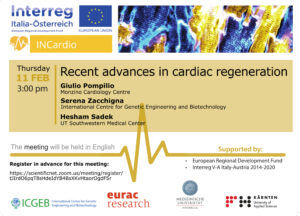30 November 2022, 2:00-5:30 pm: INCardio – Final Event „Innovative therapies for cardiovascular disease“
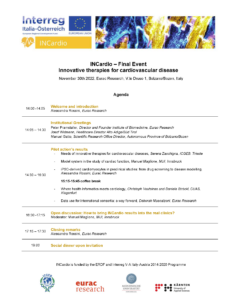
INCardio Final Event_Agenda ENG
14 September 2022, 2:00-3:30 pm: Webinar „Cardiac arrhythmias and novel tools for the definition of new anti-arrhythmic therapies“
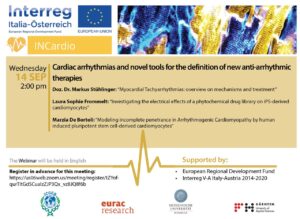
INCardio_Webinar_2022-09-14_EN
6 April 2022, 14.00-14.45: Webinar „Ex-Vivo Machine Perfusion: Next step in heart preservation and therapeutic intervention“
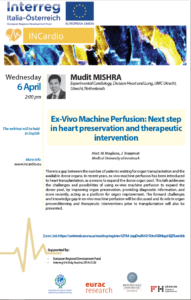
INCardio_Webinar_2022-04-06_EN
16 March 2022, 10 – 12.15: Web meeting „Ischemia reperfusion injury and cardioprotection: what’s new?“
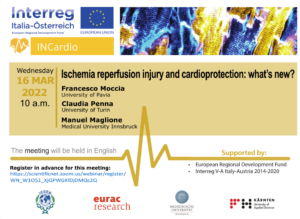
INCardio_Web Meeting_16MAR_Agenda_ENG
A new monoclonal antibody for heart attack and ischemic heart disease therapy
Cardiovascular disorders are the leading cause of death and the greatest healthcare cost worldwide. In Italy, over 20 billion euros a year are spent on treating these disorders. And the numbers are set to grow over the coming years.
A new study published in Nature Communications [1] has shown the efficacy of a new biological drug, a monoclonal antibody capable of blocking fibrosis and protecting the heart muscle after myocardial infarction. The study showed that this antibody has a beneficial effect by means of a double mechanism: on the one hand, it reduces the deposition of fibrous tissue which limits the heart’s pump function, and on the other, it promotes the survival of heart muscle cells.
The study, led by Serena Zacchigna, professor of Molecular Biology at the University of Trieste and head of the Cardiovascular Biology lab of the International Centre for Genetic Engineering and Biotechnology (ICGEB) in Trieste, represents a turning point in the sector of innovative cardiovascular therapies.
“In contrast to the great social and healthcare pressure exerted by these diseases, the drugs we use to treat patients with heart disease are rather dated. New biological therapies” – explains Zacchigna – “are transforming oncological or hereditary disease treatments, while there are very few biological drugs for the treatment of cardiovascular disorders. The vast majority of therapies approved to date are small chemical molecules that generally have a single target, blocking the action of an enzyme or receptor, for example. By contrast, biological drugs (recombinant proteins, gene therapy products and cell therapy) reproduce elements that normally exist in our tissues and therefore, have the potential to interfere with complex therapy mechanisms. However, they are more difficult to prepare and use, as well as being more expensive, making them complicated to translate from experimental studies to patients“.
This study, which is the result of a long collaboration between the Trieste institutes (ICGEB and University of Trieste) and the University of Zagreb, Croatia, reveals the fundamental role of a family of proteins, called Bone Morphogenetic Proteins (BMPs), in the evolution of cardiac fibrosis after an ischemic event.
For years, the Croatian team has been a centre of excellence for the study of BMPs which, as the name implies, play a key role in bone formation, but which have recently also been implicated in other processes, such as fibrosis.
“Having been able to collaborate with our Croatian colleagues” – says Andrea Colliva, first author of the study and UniTS researcher working at ICGEB – “has allowed us to test the effectiveness of a monoclonal antibody which blocks a particular version of BMP protein (BMP1. 3), whose levels are particularly high in patients brought to the emergency room for a myocardial infarction“.
In the last phase of the project, the University Department of Visceral, Transplant and Thoracic Surgery of the Medical University of Innsbruck (MUI) joined the Trieste-Zagreb axis and contributed their experiences and skills to the mechanisms underlying ischemic damage and the development of innovative therapies. This was made possible by the INCardio project – Innovative Therapies for Cardiovascular Disorders, led by ICGEB and financed by the European Regional Development Fund and by Interreg V-A Italy-Austria 2014-2020. “The collaboration with the Austrian colleagues”, continues Colliva, “will be fundamental to validate the results of this study in other contexts of ischemia and fibrosis and to pave the road towards a possible clinical application of these results”.
Promoting cross-border innovation in the treatment of cardiovascular disorders is precisely the main objective of the INCardio cross-border project, which has consolidated the project and unites about thirty researchers working in the sector. „We are confident that this work will open the door to other biological drugs in the cardiovascular sector” concludes Zacchigna, “as we need cooperation and collaboration among different skills to ensure that the study results can reach patients and that this can also be applied in Italy“.
Press contact:
ICGEB
Suzanne Kerbavcic, Head of Communications, Public Information and Outreach International Centre for Genetic Engineering and Biotechnology (ICGEB), Trieste kerbav@icgeb.org, Tel: +39-040-3757315 |Cell: +39-3405971692
MUI
Ms Barbara Hoffmann-Ammann | PR Office
Medical University of Innsbruck
barbara.hoffmann@i-med.ac.at
References:
[1] Bone morphogenetic protein 1.3 inhibition decreases scar formation and supports cardiomyocyte survival after myocardial infarction https://www.nature.com/articles/s41467-021-27622-9
13. Oktober 2021 10:00 – 12:00 h: Webinar „Cardiovascular Disorders – Insights into New Methods & Research Findings“
October 7th, 2021: Communication event „Curing a broken heart„
How can you cure a broken heart? On #WorldHeartDay, 29 September 2021, we are pleased to announce the event: „Curing a Broken Heart“ – an Italy-Austria Interreg collaboration project on innovative therapies to fight cardiovascular diseases. Brought to you by the Medical University of Innsbruck and partners, ICGEB, EURAC Research, CUAS
July 29th, 2021: Webinar „Modeling and Simulation of cardiac electrophysiology„
In this talk an overview about and introduction into the possibilities of modeling and in-silico simulating electrophysiological behavior of cardiac cells and compounds is given. The forward problem of electrophysiology will be explained, and practical application of the so-called inverse problem of electrophysiology – Non-Invasive Imaging of Cardiac Electrophysiology (NICE) – will be introduced. Also, patient-individual results of NICE, which were validated with interventions in the electrophysiology lab will be addressed and shown. For consideration of mechanical forces and their possible implications on proliferation of myocardial cells as an outlook the potential links between electrophysiological and electromechanical
modeling and simulation approaches will be addressed and discussed.
Zoom-Link: https://us06web.zoom.us/meeting/register/tZEpcOyorDIrGdB1s3gDzdErR9QGb4jOgDyU
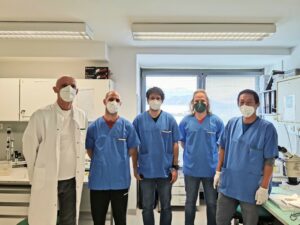
#ICGEB – #MUI joint experiments have started to find innovative therapies for cardiovascular disorders, within the INCardio project, funded by the ERDF and Interreg V-A Italy-Austria. The collaboration between the Italian and Austrian institutions allows the exchange of knowledge between young researchers, strengthening the technical and scientific capacity between the two countries.
February 11th, 2021: Webinar „Recent advances in cardiac regeneration„
The project INCardio-Innovative Therapies for the Treatment of Cardiovascular Diseases, funded by the European Regional Development Fund and Interreg V-A Italy-Austria 2014-2020, intends to create a centre of excellence able to strengthen Research & Innovation capacities in the Italy-Austria cross-border area in order to promote the development of cutting-edge technologies and therapeutic approaches that can improve the conditions of patients suffering from cardiovascular diseases.
One of its objectives is also to improve the training of researchers in the Programme area in the field of cardiovascular disorders, through seminars and workshops. In order to promote the exchange of knowledge and to share scientific results, the project partners have organised a series of online webinars open to the public.
On Thursday 11 February 2021, Eurac Research hosted the second event of the INCardio project, entitled „Recent advances in cardiac regeneration », with a programme of three presentations on recent advances in scientific research aimed at stimulating the innate regenerative response of cardiovascular tissues through different strategies.
The first talk was given by Dr Giulio Pompilio of the Monzino Cardiology Centre, who discussed the positive role of treatment with G-CSF (Granulocyte Colony-Stimulating Factor) in patients with ST-segment elevation myocardial infarction (STEMI).
Next, Dr Serena Zacchigna from the ICGEB-International Centre for Genetic Engineering and Biotechnology presented the results of the latest research on the regenerative and angiogenic capacity of the heart in adult mammals.
Finally, the third speaker was Dr Hesham Sadek from UT Southwestern Medical Center who spoke about how mechanical loading of the heart regulates cardiomyocyte proliferation.
Dr. Alessandra Rossini from Eurac Research was the host and moderator of the event, which attracted more than 80 participants from different national and international institutions.
January 25th, 2021: Webinar „Cardio protection and arrhythmia„
The project INCardio-Innovative Therapies for the Treatment of Cardiovascular Diseases, funded by the European Regional Development Fund and Interreg V-A Italy-Austria 2014-2020, intends to create a centre of excellence able to strengthen Research & Innovation capacities in the Italy-Austria cross-border area in order to promote the development of cutting-edge technologies and therapeutic approaches that can improve the conditions of patients suffering from cardiovascular diseases.
One of its objectives is also to improve the training of researchers in the Programme area in the field of cardiovascular disorders, through seminars and workshops. In order to promote the exchange of knowledge and to share scientific results, the project partners have organised a series of online webinars open to the public.
On Monday 25 January 2021, the ICGEB organised its first event entitled ‚Cardioprotection and arrhythmia‘, which brought together three notable figures in cardiology research. The speakers demonstrated the great potential of using induced pluripotent stem cells (iPS cells) to study the electrical and mechanical properties of heart cells in order to find cures for cardiovascular diseases. In particular:
Elisa de Pasquale from Humanitas Research Hospital explained how models based on iPS cells are used to investigate the molecular mechanisms underlying the development of hereditary cardiomyopathies, such as those caused by mutations in the LMNA gene. Using these cells, she generated three hypotheses that could explain the clinical manifestations of the disease (dilation of the heart, electrical signal conduction defects in the heart, atrial and ventricular arrhythmias and sudden cardiac death).
Milena Bellin from the Veneto Institute of Molecular Medicine then showed how heart cells and microtissues derived from human iPS cells can be used to create models of genetic diseases as well as for drug screening.
Finally, Mark Mercola from the Stanford Cardiovascular Institute demonstrated how screening platforms applied to cardiac cells derived from iPS cells can help develop more effective drugs and remove their cardiotoxicity.
The event, hosted by Serena Zacchigna, was attended by 89 people.
December 16th, 2020: Kick-Off-Meeting of INCardio
